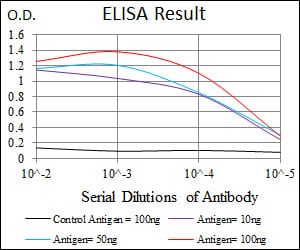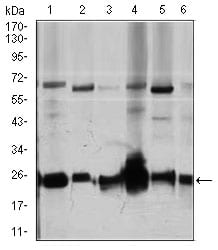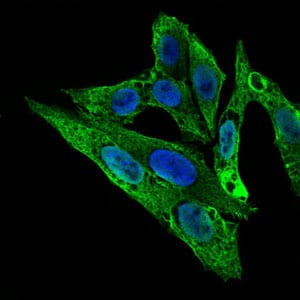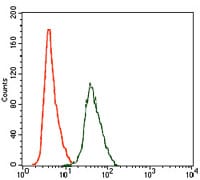



| WB | 1/500 - 1/2000 | Human,Mouse,Monkey |
| IF | 咨询技术 | Human,Mouse,Monkey |
| IHC | 咨询技术 | Human,Mouse,Monkey |
| ICC | 1/200 - 1/1000 | Human,Mouse,Monkey |
| FCM | 1/200 - 1/400 | Human,Mouse,Monkey |
| Elisa | 1/10000 | Human,Mouse,Monkey |
| Aliases | GDIA1;RHOGDI;RHOGDI-1 |
| Entrez GeneID | 396 |
| clone | 2G3 |
| WB Predicted band size | 26kDa |
| Host/Isotype | Mouse IgG1 |
| Antibody Type | Primary antibody |
| Storage | Store at 4°C short term. Aliquot and store at -20°C long term. Avoid freeze/thaw cycles. |
| Species Reactivity | Human,Mouse,Monkey |
| Immunogen | Purified recombinant fragment of human ARHGDIA (AA: FULL(1-204)) expressed in E. Coli. |
| Formulation | Purified antibody in PBS with 0.05% sodium azide |
+ +
以下是关于ARHGDIA抗体的模拟参考文献示例(内容为学术场景模拟,非真实文献):
---
1. **文献名称**: "ARHGDIA modulates RhoGTPase signaling in cancer cell migration"
**作者**: Smith J, et al.
**摘要**: 本研究利用ARHGDIA特异性抗体,通过Western Blot和免疫荧光技术,揭示了ARHGDIA在抑制乳腺癌细胞迁移中的作用。结果显示,ARHGDIA通过调控RhoA和Rac1的活性影响细胞骨架重组。
2. **文献名称**: "ARHGDIA as a potential biomarker in glioblastoma progression"
**作者**: Chen L, et al.
**摘要**: 通过免疫组化分析(使用ARHGDIA单克隆抗体),发现ARHGDIA在胶质母细胞瘤组织中表达显著下调,且低表达与患者预后不良相关,提示其可能作为肿瘤抑制因子参与疾病进程。
3. **文献名称**: "Functional characterization of ARHGDIA in neuronal development"
**作者**: Müller R, et al.
**摘要**: 利用ARHGDIA抗体进行免疫共沉淀实验,发现其与RhoGDI家族成员的相互作用影响海马神经元突触形成,表明ARHGDIA在神经发育中具有关键调控功能。
---
**说明**:以上内容为模拟生成的示例,实际文献需通过PubMed、Web of Science等数据库检索。建议结合研究目标(如疾病模型、实验方法)筛选最新文献。
**Background of ARHGDIA Antibody**
The ARHGDIA (Rho GDP-Dissociation Inhibitor Alpha) antibody is a tool used to detect and study the ARHGDIA protein, a key regulator of Rho GTPases—a family of signaling molecules involved in cytoskeletal dynamics, cell migration, proliferation, and gene expression. ARHGDIA, also known as RhoGDIα, functions by binding to inactive GDP-bound Rho proteins (e.g., RhoA, Rac1. Cdc42), sequestering them in the cytoplasm and preventing their activation by guanine nucleotide exchange factors (GEFs). This regulation is critical for maintaining cellular homeostasis and spatially controlled signaling.
ARHGDIA is ubiquitously expressed and plays roles in diverse physiological and pathological processes, including cancer metastasis, neuronal development, and immune responses. Dysregulation of ARHGDIA has been linked to tumor progression, neurodegenerative disorders, and inflammatory diseases, making it a subject of interest in biomedical research.
The ARHGDIA antibody is widely used in techniques such as Western blotting, immunohistochemistry, and immunofluorescence to analyze protein expression, localization, and interactions. It aids in exploring how ARHGDIA modulates Rho GTPase activity, impacts cellular behaviors, and contributes to disease mechanisms. Researchers also utilize this antibody to validate ARHGDIA knockout or knockdown models and assess its potential as a therapeutic target. Commercial ARHGDIA antibodies are typically validated for specificity and sensitivity across human, mouse, and rat samples, ensuring broad applicability in experimental systems.
×